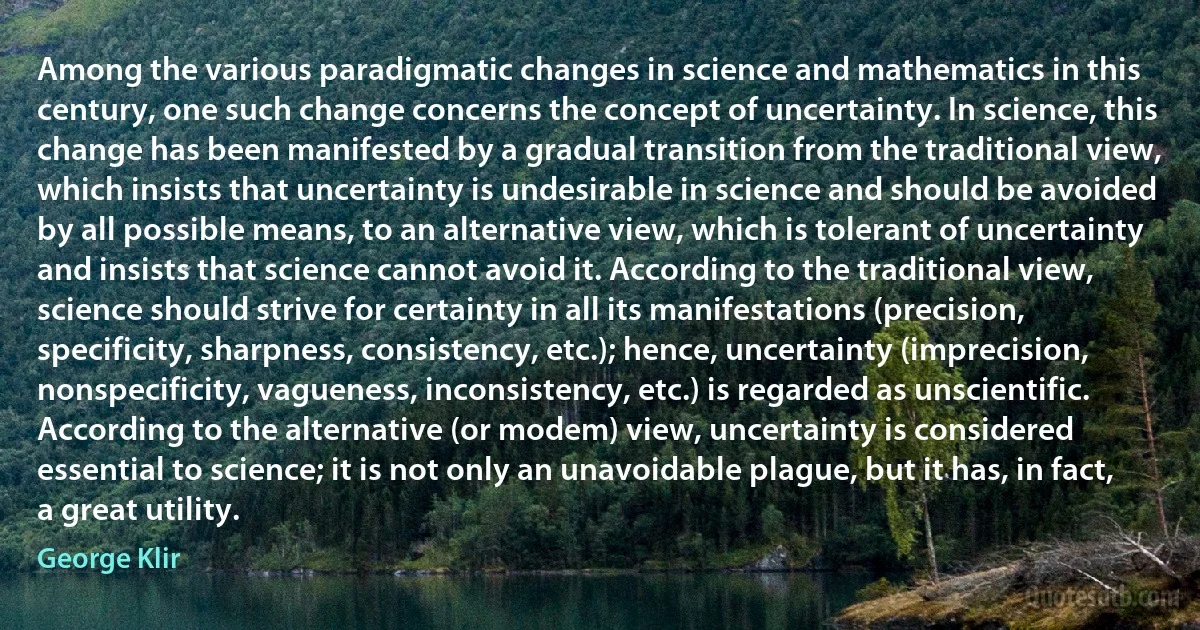
Among the various paradigmatic changes in science and mathematics in this century, one such change concerns the concept of uncertainty. In science, this change has been manifested by a gradual transition from the traditional view, which insists that uncertainty is undesirable in science and should be avoided by all possible means, to an alternative view, which is tolerant of uncertainty and insists that science cannot avoid it. According to the traditional view, science should strive for certainty in all its manifestations (precision, specificity, sharpness, consistency, etc.); hence, uncertainty (imprecision, nonspecificity, vagueness, inconsistency, etc.) is regarded as unscientific. According to the alternative (or modem) view, uncertainty is considered essential to science; it is not only an unavoidable plague, but it has, in fact, a great utility.
George KlirRelated topics
alternative century certainty change concept consistency gradual great imprecision inconsistency mathematics plague possible precision science should sharpness strive traditional transition utility vagueness view etc means modem specificityRelated quotes
First of all I want to remind you of the essential features of models. In my opinion they are: (i) drawing up a list of the variables to be considered; (ii) drawing up a list of the equations or relations the variables have to obey and (iii) testing the validity of the equations, which implies the estimation of their coefficients, if any. As a consequence of especially (iii) we may have to revise (i) and (ii) so as to arrive at a satisfactory degree of realism of the theory embodied in the model. Then, the model may be used for various purposes, that is, for the solution of various problems. The advantages of models are, on one hand, that they force us to present a "complete" theory by which I mean a theory taking into account all relevant phenomena and relations and, on the other hand, the confrontation with observation, that is, reality. Of course these remarks are far from new.

Jan Tinbergen
But let us not speak anymore of books and theories on paper. Now then, did you see my exhibition? As you may remember, 1 gathered in 'Cahiers d'Art' ten very recent paintings, twenty-five gouaches and watercolors, also recent, and twenty-eight drawings that span the period from 1910-1934. In the majority of the compositions on canvas I used a sand technique more or less consistently.... but I usually don't distinguish between traditional oil painting, gouache, tempera and watercolor, and I even simultaneously use the various techniques in the same work. What is essential for me is to be able to clearly convey what I want, to recount my dream. / consider both technique and form to be mere instruments of expression, and my stories, furthermore, are not narrative or historical in character, but purely pictorial.

Wassily Kandinsky
It seems that cybernetics is many different things to many different people. But this is because of the richness of its conceptual base; and I believe that this is very good, otherwise cybernetics would become a somewhat boring exercise. However, all of those perspectives arise from one central theme; that of circularity. When, perhaps a half century ago, the fecundity of this concept was seen, it was sheer euphoria to philosophize, epistemologize, and theorize about its unifying power and its consequences and ramification on various fields. While this was going on, something strange evolved among the philosophers, the epistemologists and, the theoreticians. They began to see themselves more and more as being included in a larger circularity; maybe within the circularity of their family; or that of their society and culture; or even being included in a circularity of cosmic proportions!

Heinz von Foerster
Microeconomics, including the study of individual choice and of group choice in market and nonmarket processes, has generally been considered a field science as distinct from an experimental science. Hence microeconomics has sometimes been classified as "non-experimental" and closer methodologically to meteorology and astronomy than to physics and experimental psychology (Marschak, 1950, p. 3; Samuelson, 1973, p. 7). But the question of using experimental or nonexperimental techniques is largely a matter of cost, and generally the cost of conducting the most ambitious and informative experiments in astronomy, meteorology, and economics varies from prohibitive down to considerable. The cost of experimenting with different solar system planetary arrangements, different atmospheric conditions, and different national unemployment rates, each under suitable controls, must be regarded as prohibitive.

Vernon L. Smith
One demand for a concept of need arises because the concept of demand itself has serious weaknesses and limitations. It assumes away, for instance, a serious epistemological problem. The very idea of autonomous choice implies first that the chooser knows the real alternatives which are open to him, and second that he makes the choice according to value criteria or a utility function which he will not later regret. Both the image of the field of choice and the utility function have a learning problem which, by and large, economists have neglected. This problem is particularly acute in the case of medical care, where the demander is usually a layman faced with professional suppliers who know very much more than he does. The demand for medical care, indeed, is primarily a demand for knowledge or at least the results of knowledge...

Kenneth Boulding
